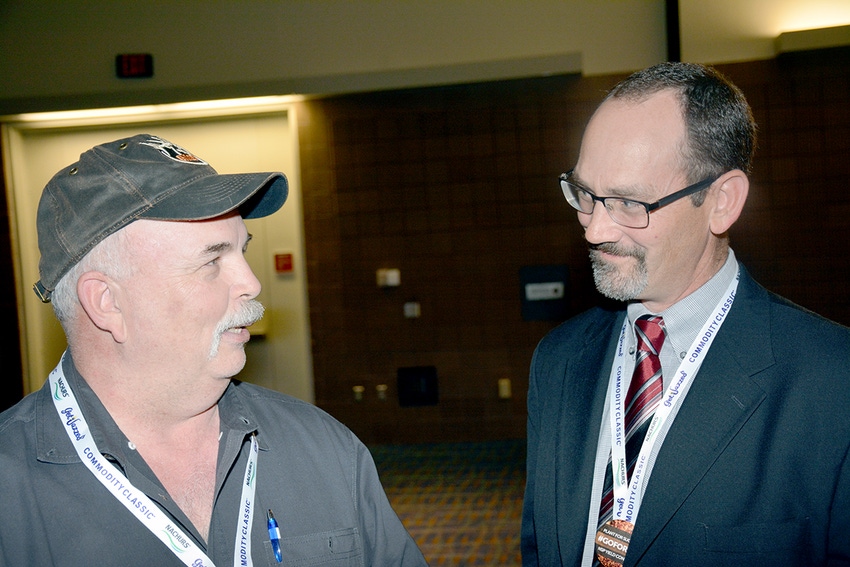
‘Follow the money’ when environmental activist groups come calling
“Pathological science is the generation of headlines meant to scare and intimidate people and change people’s purchasing habits,” says Hayes. “We see it a lot in agriculture with headlines like ‘This crop can cause cancer’ or ‘This crop may hurt your family in this way.’"
March 9, 2016

Many farmers would have a less flattering term for the anti-pesticide, anti-commercial agriculture propaganda spewed out almost daily by environmental activist groups, but someone has come up with a more polite term for it.
Pathological Science is a term coined by chemistry Nobel laureate Irving Langmuir for the “science of things that aren’t so,” according to Phillip Hayes, partner in North Bridge Communications, and a speaker at the 2016 Sorghum General Session at Commodity Classic.
“Pathological science is the generation of headlines meant to scare and intimidate people and change people’s purchasing habits,” says Hayes. “We see it a lot in agriculture with headlines like ‘This crop can cause cancer’ or ‘This crop may hurt your family in this way.’ It’s usually a bunch of baloney with very little science behind it.”
What science may be behind such claims is not peer-reviewed and thus is suspect, says Hayes, whose clients include the American Sugar Alliance in Washington. He spoke about Consumer Connections at the National Sorghum Producers and Sorghum Checkoff meeting in New Orleans.
“It is one of the biggest challenges we have in agriculture right now,” he said, referring to the task of connecting with consumers in an interview following his presentation,.
Hayes also talked about the Environmental Working Group, the activist organization that has put the farm program payment information for thousands of U.S. row crop farmers on their website, www.ewg.org.
Not a non-profit
“The thing you need to understand is the Environmental Working Group is not a not-for-profit organization out there for the betterment of mankind,” says Hayes. “The Environmental Working Group is a business. When you take a look at the Environmental Working Group’s books what you realize is that most of the people on their payroll are PR people.
“Now, if you are a science-based organization, trust me, most of the people on your payroll are not going to be public relations professionals. They’re there to spread fear, and they’re there to try to affect consumption habits or discredit some technology they don’t like or maybe that one of their funders pays them not to like.”
During his presentation to the sorghum producers, Hayes said the EWG has turned rating products such as sun-tan lotions and house-hold cleansers into a cottage industry.
“If you look on the website, you’ll see the ratings for the different products and then you’ll see a button you can click to order the products the Environmental Working Group recommends,” says Hayes.
“I would encourage anyone when you look at the Environmental Working Group or groups like them to follow the money. Figure out where they’re getting their money, and you’re going to learn a whole lot about that organization and their agenda.”
To counter things like pathological science, farmers need to be unified, says Hayes. “I think one of the most incredible things I’ve ever seen in agriculture was this past year when all of agriculture came together – farmers, community bankers, main street businesses, and they fought back against attempts on Capitol Hill to gut crop insurance.”
Targeting insurance programs
Crop insurance was under fire because of organizations such as the Environmental Working Group, which held press briefings and distributed position papers claiming crop insurance programs were ripping off taxpayers.
“That’s the first thing,” says Hayes. “Let’s be unified in agriculture. We need to invest more in social media. We need to lead with common sense when we’re responding to these types of attacks as opposed to always leading with the peer-reviewed science.”
There’s nothing wrong with peer-reviewed science – it’s what gives agricultural creditability, says Hayes. ��“We also have to lead with some common sense, and I think that’s a good way to push back on pathological science.
“Finally, it’s discrediting organizations like the Environmental Working Group. Let’s talk about their agenda; let’s talk about what it is they’re up to so that when people receive information from pathological scientists they automatically discredit it.”
Hayes also sought to answer the question of “why agriculture is losing touch with its customer base?”
“That’s often blamed on consumers being removed from the farm, but that’s insulting and incorrect,” he notes. “Consumers today are interested in food, and they like farmers. At least 84 percent of Americans view farmers favorably and 87 percent support using federal dollars on ag.”
The problem is agriculture is not properly addressing three things 1) generational shifts, 2) a changing media landscape, and 3) the rise of pathological science, which, he says, “is the specialty of self-styled public interest groups, whose agenda too often is not protection of public health or the environment, but intractable opposition to whatever research product or technology they happen to dislike.”
For more on the National Sorghum Producers, visit http://sorghumgrowers.com/
About the Author(s)
You May Also Like





